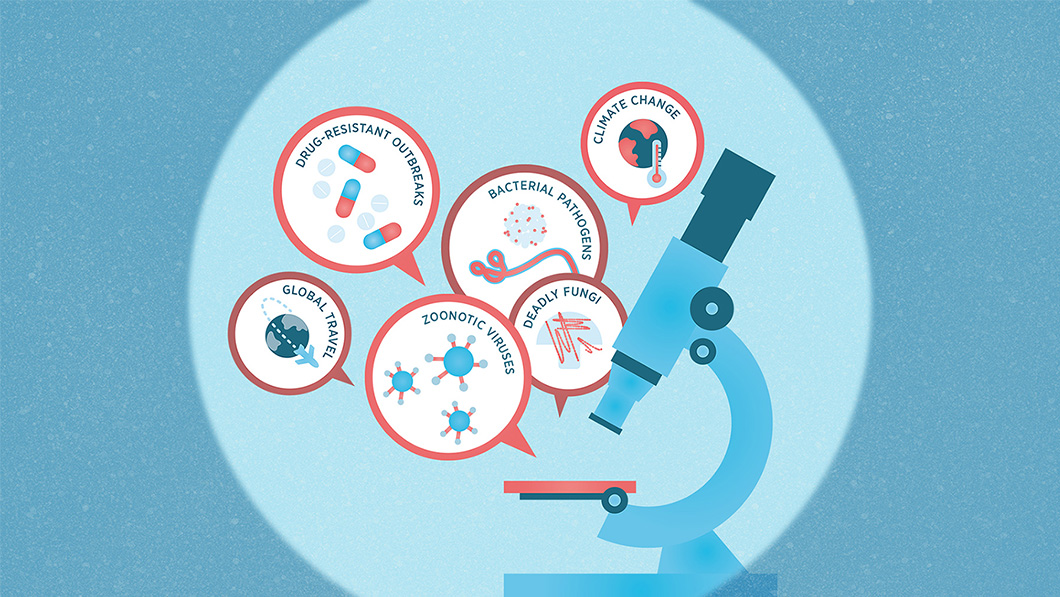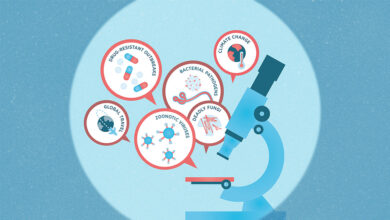
Vaccine pushback and more bird flu ills
Sponsored by:

PPF’s report The Next One: Preparing Canada for another health emergency outlines the lessons learned from the pandemic and how Canada can safeguard against future health emergencies. To keep the discussion going — and to keep Canadians informed — this newsletter looks at what’s happening in the world of health security each week. Here’s what we’re following:
Shots out of arms
Canadians appear to have more vaccine skepticism than they did before the pandemic, according to new survey data from Ipsos Reid — most notably parents with children under 18. The proportion of parents of minors who say they’re “really against” vaccinating their kids has increased four-fold since 2019 to 17 percent of respondents. At the same time, the proportion of Canadians who say they support mandatory childhood vaccination in schools has fallen from 70 percent in 2019 to just 55 percent now. The proportion of those opposed to mandatory vaccinations has risen in turn, from 24 percent in 2019 to 38 percent in 2024. Notably, 61 percent of respondents from Ontario support mandatory vaccinations at school, where there is such a program in place, compared to just 48 percent of those from Alberta, where there isn’t. The survey also revealed that nearly a quarter (22 percent) of respondents agreed with the statement “the human body doesn’t need vaccines to build immunity.” Canadians are also more inclined to believe that there is a “real risk of serious side effects” from vaccines, even as the proportion of respondents who question the science behind vaccines has fallen since 2015. Still, vaccines appear to be a controversial topic. Nearly a quarter (24 percent) of respondents said they’re afraid to bring up the topic of vaccines with their family. And when it comes to political party affiliation, vaccines are a dividing line. Fully half of respondents who said they would vote Conservative federally were categorized as “anti-vax” (22 percent) or “vax skeptics” (28 percent) by the pollster. In contrast, just 23 percent of Liberal voters fell into those categories — four percent “anti-vax” and 19 percent “vax skeptics.” Worrying responses regarding vaccines aside, most Canadians remain supportive of them. Seventy-one percent of respondents overall also agreed that “the anti-vaccine movement is going to end up with a lot of people getting sick unnecessarily.”
Listen to WONK: Edward Greenspon talks to the Clerk of the Privy Council John Hannaford
A lab leak
A CSIS intelligence assessment was among the hundreds of documents the federal government released this past week about two scientists, Dr. Xiangguo Qiu and her husband, Keding Cheng, who were dismissed from their positions at the Level 4 virology facility at the National Microbiology Lab (NML) in Winnipeg in July 2019. Their dismissal, which wasn’t announced until 2021, raised eyebrows and theories about Chinese state espionage, particularly after it was revealed that Dr. Qiu had sent live Ebola and Henipah viruses to China in March 2019. Prior to that point, however, Dr. Qiu was known as a leading researcher on ZMapp, an effective treatment for Ebola for which she received the Governor General’s Innovation Award in 2018. As the newly released documents show, CSIS conducted multiple security screenings on the couple. In January 2021, CSIS assessed that Dr. Qiu “developed deep, cooperative relationships with a variety of People’s Republic of China (PRC) institutions and has intentionally transferred scientific knowledge and materials to China in order to benefit the PRC Government, and herself, without regard for the implications to her employer or to Canada’s interests.” Despite this, the documents released do not show that either Dr. Qiu or her husband were put up to any of their actions by agents working for China. Responding to the revelations in the CSIS assessment, federal Health Minister Mark Holland admitted that the extent of China’s influence on Canada’s scientific community “was not known to the extent it was today.”
Primary care, not for everyone
A comprehensive investigation on the state of Canadian health care has revealed deep dissatisfaction with the system. The OurCare initiative, run out of St. Michael’s Hospital in Toronto, conducted a national survey and convened panels and community roundtables across the country over the past 16 months. Among the study’s findings in its final report about 6.5 million people don’t have a family doctor or nurse practitioner that they see regularly. That overall proportion isn’t equally distributed across regions or age ranges. The study found that about a third of people in both Atlantic Canada and Quebec said they don’t have a regular family doctor or nurse practitioner (more positively, that drops to 16 percent in the Prairies and to 13 percent in Ontario). Perhaps unsurprisingly, the older Canadians get, the more likely they are to have a regular health provider. More than a third (35 percent) of Canadians aged 18-29 don’t have a family doctor, compared to around a quarter (24 percent) of those aged 20-29. Only 17 percent of Canadians aged 50-64 said they don’t have a regular health provider. But having a regular doctor doesn’t always mean Canadians can see them. The OurCare study found that 35 percent of those surveyed who do have some sort of regular health-care provider can’t get same-day or next-day appointments when they need urgent care — increasing the likelihood they will end up in one of Canada’s crowded emergency rooms. “If we don’t make meaningful change to primary care, we’re going to see people’s health deteriorate,” study lead and family doctor Dr. Tara Kiran told the CBC. “That means their mental health, their physical health, their social well-being. And, ultimately, it’s going to mean people having a worse quality of life.” In a recent report, PPF argued that everyone in Canada should have timely access to a publicly funded primary-care team within 30 minutes of where they live or work — just as local schools are available to every child in Canada. Here’s our Urgent To-Do List for Reform.
AI’s impact on Canadian health care
A new report from the consulting firm McKinsey says that efforts based on known Artificial Intelligence applications — deployed at full scale — could allow Canada to lower its net health-care spending by between 4.5 and 8 percent every year (anywhere from $14 billion to $26 billion) “without negatively affecting outcomes and experience.” McKinsey says AI could potentially improve quality of care, enhance patient and staff experiences, simplify administrative work, lower spending and optimize system management. But making it happen won’t be easy. McKinsey points to Canada’s decentralized delivery system, as well as differentiated approaches to risk management as challenges. Uptake and acceptance from health-care workers and patients are also hurdles — what McKinsey calls “change management” Will anyone trust AI? To fill what role? And what about our data? “Health-care delivery is a complicated task. Left unregulated — professionally or internationally — it presents challenges to quality of care, privacy and security,” Jordan Richard Schoenherr, Assistant Professor of Psychology at Concordia University, wrote in The Conversation last week, cautioning against AI implementation for the sake of it. A new survey of American clinicians echoes Schoenherr’s wariness. The survey revealed that while most clinicians have used AI — like large language models — and are optimistic about AI’s future impact in health care, they “remain wary of using AI for health care in the near term.” Only 22 percent said they trust current AI and 40 percent said they believe AI will put them at greater risk of liability. “The path forward will require boosting trust, training and regulation,” the survey authors concluded.
Cyberattack setback
The significant cyberattack on Change Healthcare in mid-February offered an alarming look at how exposed health systems can be to outside attacks. The attack, which the company said was “perpetrated by a cybercrime threat actor who has represented itself to us as ALPHV/Blackcat,” could impact systems for several weeks. (ALPHV/Blackcat is a Russia-based ransomware group.) Change Healthcare is part of UnitedHealth Group and processes insurance claims and pharmacy requests for hundreds of thousands of physicians and pharmacists in the U.S. The cyberattack forced UnitedHealth Group to disconnect impacted systems, which has created a mountain of paper-based work for doctors, as they’ve been unable to check things like drug eligibility for patients electronically. At the same time, health providers have been unable to receive reimbursements from insurance companies, meaning medical practices may struggle with payroll or purchasing medical supplies. “We have so many practices that are on the fringe, particularly smaller practices, where they are just scraping by,” Dr. Jesse Ehrenfeld, president of the American Medical Association, told CNBC. “Any aberration in the system where, ‘Oh, you don’t get checks for two weeks,’ obviously is a situation that does put practices at risk.”
Avian flu in Antarctica
A deadly strain of avian flu is confirmed to have reached Antarctica’s mainland for the first time, in dead skua seabirds. The H5N1 strain of avian flu has already led to the deaths of millions of birds worldwide, hitting every continent apart from Oceania. In January it was found to have infected gentoo penguins in the Falkland Islands. But the virus has also hit mammals, including elephant and fur seals, and late last year, scientists also confirmed that a polar bear had died of H5N1. In the fall, a team of researchers from the UK and Falkland Islands concluded that if the virus “does enter penguin colonies, it could show rapid infection and spread,” and that if it “does start to cause mass mortality events across penguin colonies, it could signal one of the largest ecological disasters of modern times.”
Events
March
- March 8: Networking with Inspiring Women in Science. Toronto, ON
- March 8-12: SXSW Health and MedTech Track 2024. Austin, TX
- March 11-15: 2024 HIMSS Global Health Conference. Orlando, FL
- March 11-15: LAMedTechWeek. Los Angeles, CA
- March 14-15: WHO International Working Group for Drug Statistics Methodology.
- March 14-17: Annual World Conference of SBMT. Los Angeles, CA
- March 19-21: Rare Diseases Summit. Philadelphia, PA
- March 25-27: Ketamine and Related Compounds International Conference 2024. Oxford, UK
- March 26-28: Precision Med TRI-CON. San Diego, CA
April
- April 15-17: Bio-IT World Conference & Expo. Boston, MA
- April 17-18: CMO Summit 360. Boston, MA
Did someone forward you this newsletter? Subscribe to PPF: Health Security newsletter



